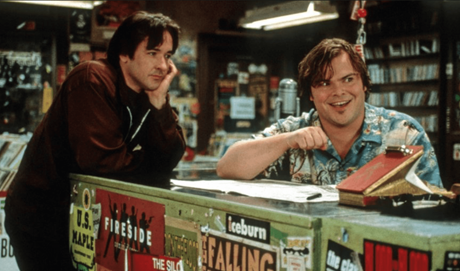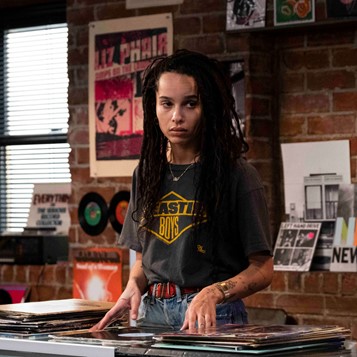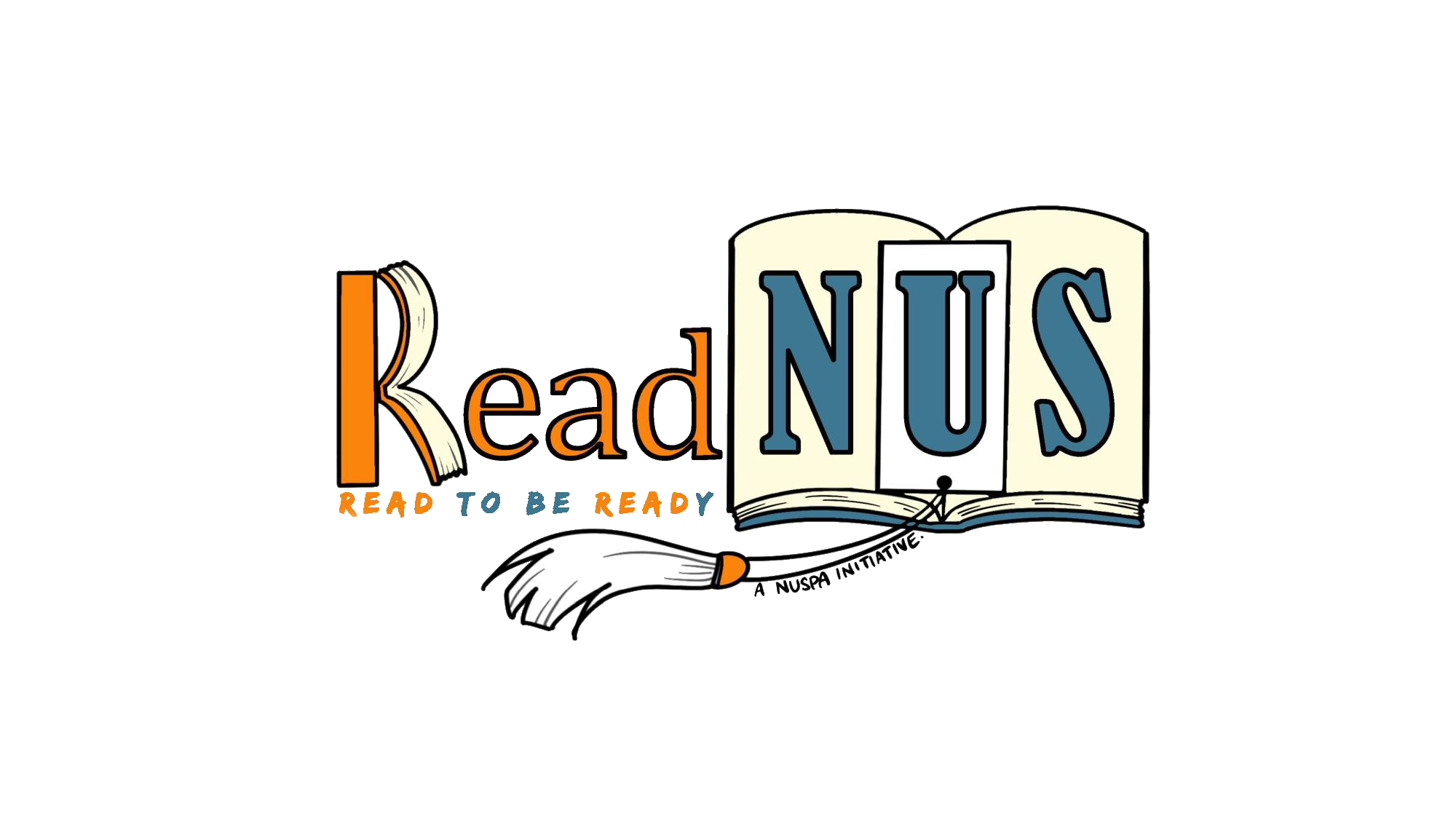Is “Adaptation Infidelity” Inevitable?: A Review of Nick Hornby’s High Fidelity, Stephen Frears’ High Fidelity (2000) and Hulu’s High Fidelity (2020)
Have you ever been around people or been one of those people who are absolute die-hard fanatics about certain books and stories — like the culture-changing Harry Potter book series, the thrilling crime-solving adventures of the Agatha Christie mystery oeuvre, or Frank Herbert’s mind-boggling and affective epic science-fiction novel “Dune” — and then immediately express their distaste and disappointment in the movie or television adaptation once it is released in the movie theatres or streaming services? Well, ladies and gentlemen: This sentiment is more widespread than you think.
There have been many successful movie and television adaptations of popular books in the contemporary age that have rooted themselves into our popular culture experience, yet we always hear that same complaint from that one friend (or maybe from ourselves, yikes!) that the film wasn’t as good as the book; or that the film did not stay true to the book’s story arc and character developments. But don’t fret: This review isn’t one that seeks to shame every book loyalist out there. While it is encouraged that every moviegoer and consumer of the arts ought to maintain an open mind while viewing the adaptation and to be receptive to new ways of adapting and presenting the source text, it isn’t an entirely disagreeable stance to remain adamant about a book’s prevailing authenticity and superiority to any successive adaptations of it.
The Thing About Authenticity and Why We Care So Much About Text Fidelity
From my many playful and ever-churning musings about the reasons why we — as moviegoers and bookworms — gravely dislike the film or television versions of books, it is clear that this polarising reception has lent itself to an avid reader’s vacillating position between excitement at seeing their favourite stories (that could only be imagined in their heads) come to life on the big screen, and the major disappointment and subsequent frustration after being let down by the visualised novel, which is commonly expressed in the phrase: “I prefer the book.” Here’s why this dilemma even exists.
We, as novel enthusiasts and loyal readers of the written word, tend to hold these adaptations to unreasonably high standards in terms of its faithfulness and fidelity to the story’s plot and characters just the way the author intended it, or at least in how we interpret it in our own subjective minds. Having read the original written word with a lens of newfound discovery and virgin adventure, our minds prize the source text as the primal and thus, superior story vessel. Any other transposition of the source is automatically expected to have the content and style of the original novel translated verbatim onto the big screen. Each one of us also develops a certain specific idea about how the characters and cast should look and act in the movie or television adaptation of the book, making it nearly impossible to please everyone’s subjective preference for cast members in an adaptation (unless it’s Emilia Clarke as Daenerys Targaryen of course, duh) (Sheri K, Aisles of Life).
So where does this puzzling conundrum find its seemingly obscure resolution? Does it ever? Allora, I don’t think it ever does, but I believe that this intellectual quandary can be met with a negotiation between the value of fidelity to the source text and how effective the story is conveyed based upon the adaptation’s faithfulness to the source. Factors that must be taken into account when transposing the source to an adaptation include, but are not limited to, the visual medium of storytelling, the limited time duration of the movie or episodic retelling, the director’s narrative liberties and the reimagining of the characters through the movie cast members. Now — are you ready for the ultimate comparative review fiesta? ¡Vámonos!
A Review of Stephen Frears’ “High Fidelity (2000)” Against Nick Hornby’s “High Fidelity”

I’ll admit that I wasn’t a fan of Frears’ adaptation of “High Fidelity” when I first watched it. From the beginning of the movie to the end, the film seemed as if it was trying to mimic the original source text to a tee. And to be frank, it was cringey and boring, even with the all-star performances from John Cusack, Jack Black, and Lisa Bonet.
While the 2000 movie had pretty decent reviews and award nominations, I felt that Frears’ lack of directorial imagination and spontaneity in his effort to stay true to the original text actually made his movie fall short and lose its magic. (Warning: Spoilers ahead.)
The 1995 book by the English author Nick Hornby is told through the self-indulgent protagonist Rob Fleming who narrates the story as a self-proclaimed music aficionado and obsessive. Fed up with his lack of luck in love after his most recent breakup, he goes on to probe his top five worst break ups in order to better understand his most recent heartbreak. When Rob is dumped by his lawyer ex-girlfriend Laura, who is having a fling with a former neighbour, he goes through a comedic period of indignation and self-indulgence where he lists his Top Five Most Memorable Heartbreaks that is akin to his hobby of constructing desert-island “top five lists of anything” with his friends: 1) Alison Ashworth, 2) Penny Hardwick, 3) Jackie Allen, 4) Charlie Nicholson, and 5) Sarah Kendrew. He also makes sure to not include Laura in the list as he refuses to give her the satisfaction of being someone with this kind of heart-breaking power over him.
Hornby’s one-of-a-kind book was a sensation in its day for its stream-of-consciousness and observational narrative style that introduced its readers to the raw and unfiltered daily musings of the main antihero protagonist Rob Fleming. His book gave untarnished insight into the emotional yet humorous internal rage and self-deprecation of the failed record shop owner going through his mid-30s existential crisis, and many would argue that the introspective voice and perspective of the bitter and insecure male protagonist cannot be replicated onto a visual medium. What the book offered to the world was a unique glimpse into the internal psyche of the hapless male figure and the idea of settling for something that isn’t beneficial for one’s personal growth in the end despite Rob’s interrogation of his previous mistakes in order to better pave the way for his future. This alludes to the book’s ending where Laura and Rob get back together despite their many issues and Laura’s cheating.
The chutzpah (i.e. audacity) in exposing the people that broke his heart acts as an unveiling of his own insecurities and inadequacies as a man in the twentieth century, particularly in coping with the emotional trauma and healing process. This thus dispels stereotypes of men being incapable of emotional rumination and understanding. The parallels to music and 90s British pop culture is strong in Hornby’s book, whereby music is known, for us all, as a vessel that carries and elicits emotion, and it triggers certain memories for many as we tune into our favourite songs. Rob’s obsession with music shapes his self-centred worldview and ego in his knowledge of music and the world, which lends a certain grunge and anarchist texture to the story. This, I would argue, is a timeless reference to his internal wrestling with the philosophical paradoxes about his experience of a myriad of emotions and sensations. This adds to the flawed and human characterisation of the protagonist that is relatable to us all:
“What came first—the music or the misery? Did I listen to the music because I was miserable? Or was I miserable because I listened to the music? Do all those records turn you into a melancholy person?” (Hornby 18).
Given the fact that this internal voice of the protagonist is hard to translate onto the screen without compromising on the cohesiveness and duration of the film, Frears’ direction to stay as close as possible to the source narrative and characters allows for a lack of difference and uniqueness in the film from the source text. This enables critics and viewers to compare the film and the book a little too closely. Unfortunately, this compromises on the effectiveness and believability of the film’s story, and the film’s lack of directorial liberties casts itself away as another boring replica of the prized novel once again.
“Laura: In fact, I hope we’re not in love anymore, to be honest. It would give me a better opinion of love right now.
Rob Gordon: Come on! What, did I beat you? Did I tell you you were a bad person? I mean, what the fuck? What shoul I have done to make you happy?
Rob Gordon: Come on! What, did I beat you? Did I tell you you were a bad person? I mean, what the fuck? What should I have done to make you happy?
Laura: Nothing. Make yourself happy.
Rob Gordon: Oh, I see. Um, wh-why am I not happy?
Laura: Because you’re the same person you used to be.. and I’m not.” (Frears, High Fidelity (2000))
While John Cusack’s performance as the reimagined Rob Gordon in the film was commendable and engaging as he attempted to channel Rob in the centre-shots of him looking into the camera and speaking to us about his inner thoughts, it wasn’t enough to retain my attention. This movie being the direct replication of the book enabled a greater margin for the perceived inadequacy in meeting the standards of the novel’s story progression and the readers’ expectations of how the story can be effectively told.
A Review of Hulu’s “High Fidelity (2020)” Against Nick Hornby’s “High Fidelity” and Stephen Frears’ “High Fidelity (2000)”

The 20th anniversary of the 2000 film and 25th anniversary of the 1995 book was met with a television retelling of “High Fidelity” that was available in 2020 on the streaming service Hulu. Let me just say one thing: I LOVED the television series and I never thought I would. As an avid supporter of Hornby and the narrative superiority of books, I was surprised to find that the success of the television series involved a subversive and counter-fidelity re-inventiveness and reimagination of the book, instead of trying to attempt to echo the spirit of the novel.
Like the book, the series revolves around the perspective of a main protagonist, the owner of a vinyl record store in New York City, who has lost her luck in love and is hoping to find an answer to her misfortune through her examination of her top five desert-island style heartbreaks in her life. The only thing is, the series takes much more directorial and narrative liberties than it’s predecessor film. (Spoilers ahead.)
First of all, the series is set in the year 2019 and the main character and voice of the novel, Rob, was reimagined as a mixed-race girl in her 30s (Zoë Kravitz) and is going through an existential crisis after her boyfriend Mac dumps her. The dynamic between Rob and her co-workers/friends retains the same quirky nature of the book and the 2000 film, except that the series has transposed their relationship as one of greater depth, history and intimacy with one another in that they are all best friends (in the book and 2000 film, the three characters in the record store are not).
“Rob: So here’s how not to plan a career. One: split up with girlfriend. Two: ditch college. Three: go to work in struggling record shop. Four: become owner of said record shop and stay there for rest of life.” (Kravitz as Rob, High Fidelity (2020))
There is greater representation and racial and gender diversity in this new retelling of the story to complement the 21st century contemporary society. Rob’s best friend Cherise is played by African-American actress Da’Vine Joy Randolph, and the series seeks to advocate equality in love through Rob’s same-sex relationship with Heartbreak #2 Kat Monroe, whereby many critics have deemed it the answer to the gender and racial bias in the source text and previous adaptation. The characterisation of Rob as a mixed Black and White woman, and the mixed experience of not belonging or fitting neatly into any box is also poignant in mirroring her confusing relationships and romantic motivations.
From the get-go, the first episode introduces its viewers to a new rendition of the story through its modern interpretation of the breakup, the inclusion of social media, the introduction of the female perspective in the emotional trauma and healing process, and the revamping of the story’s narrative to suit that female perspective and American environment. As opposed to the book’s setting in London, UK, the series follows the previous adaptation in the setting of the USA and scales it down to the vibrant eclectic New York City. Such a setting cleverly parallels the beautiful chaotic nature of the English city, yet maintains a sense of originality in the telling of the story in a new environment. The failure of Rob’s career and life trajectory is accentuated by the fact that she owns a failed vinyl record store in the 21st century, which portrays her character as ostensibly trapped in an obscure pattern and position in life and society.
“Rob: Making a playlist is a delicate art. It’s like writing a love letter but better in a way. You get to say what you want to say without actually saying it. You get to use someone else’s poetry to express how you feel. And then there are the rules. It’s got to be entertaining. You got to tell a story. You can’t be too obvious but you can’t be too obscure either. You can’t double up on songs by the same artist, unless, of course, that’s your theme. Anyway, a good compilation, like so many things in life, is hard to do.” (Kravitz as Rob, High Fidelity (2020))
The series also draws upon the 2000 film’s technique of breaking the fourth wall as she directly speaks to the audience about her internal ruminations. Yet, as opposed to the previous film, I found Kravitz’s performance in breaking the fourth wall tasteful and endearing because, in my opinion, it seemed more believable and convincing for a downtrodden female character like Rob, characterised as distraught rather than rageful, to vocalise her thoughts in a comedic fashion. In the 2000 film, Cusack’s Rob was characterised as embittered and disgruntled, and his monologues were often off-putting and ineffective in conveying Hornby’s perfectly poignant and witty words effectively. To add on to the gender bias dialogue that the 2000 film unintentionally exposes, Cusack’s irate tone in his monologues to the camera also simulate a feeling of male entitlement in relationships and ‘mansplaining,’ if you will, of music references that only he can make and no one else can…but anyway…
“Sentimental music has this great way of taking you back somewhere at the same time that it takes you forward, so you feel nostagic and hopeful all at the same time.” (Hornby 50)
The series also revamps the story to focus on greater romantic ideals and American idealism in the story of Rob and her ex-fiance Mac (Kingsley Ben-Adir). (Yes, they got engaged in the series.) Here, the show places a greater emphasis on the chumminess and emotional intimacy that the couple shared during the flashback scenes, evoking greater attachment and hope from the audience that they might get back together. I believe that this was a terrific move on the part of the series’ creators ; by transposing the realist and anti-romantic original book into a more romantic narrative, this could adequately capture the audience’s attention so that they would not get bored. Also, as a call-and-answer to the flatness and near-austerity of the 2000 film, the 2020 series succeeds in meeting the visual and visceral need to heighten the viewer’s senses by hyperbolising the relationship and intimacy shared between Rob and Mac, instead of abiding by the realist nature of Hornby’s book.
In this light, I think we can safely say that “Adaptation Infidelity” is somewhat inevitable, but it doesn’t necessarily have to be the worst thing ever. While nothing can ever top Hornby’s phenomenal manifestation of realism and pessimism of real life in the book, I firmly believe that it is important that one needs to adapt the book in a slightly more sensationalised and heightened manner to fit the filmic medium. Without it, the adaptation will not only lack originality, but also that power to speak to people the way that only novels can. And that is why I will always recommend that people read the book before going to the theatres.
By: Wendi Lee
ReadNUS Editorial Member
Works Cited
Chaney, Jen. “Thank God High Fidelity Fixed Rob.” Vulture. Vulture, February 18, 2020. https://www.vulture.com/2020/02/high-fidelity-rob-zoe-kravitz-women-music-bias.html.
K, Sheri. “Books vs. Movies/TV Shows Adaptations: Why People Hate the Film Versions of Books.” Aisles of Life. Aisles of Life, December 23, 2021. https://aislesoflife.com/2021/07/02/books-vs-movies-adaptations-why-people-hate-film-versions/amp/.
